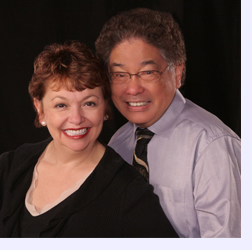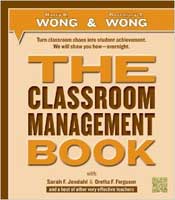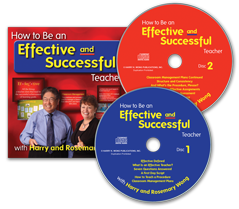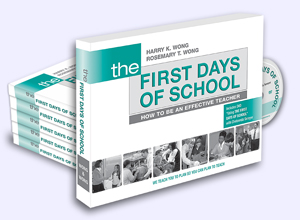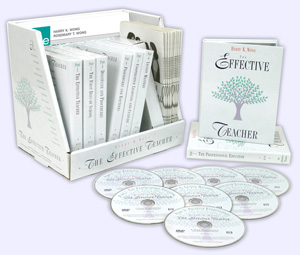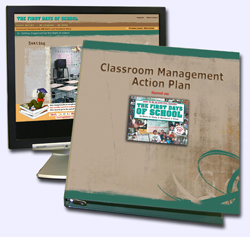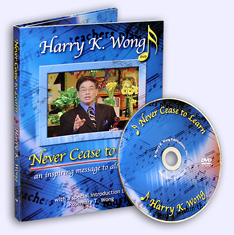|
 |
|
| |||||||||||||||
| by Harry & Rosemary Wong Special to the Gazette February 1, 2010 |
|||||||||||||||
Turning Teaching Dreams into Reality
EPI is an Alternative Certification Program for mid-career professionals and college graduates who were not education majors. This award-winning program trains and certifies individuals whose hope, dream, and aspiration is to make a difference in a child’s life. The EPI is the top program in Florida for recruiting, training, and retaining effective teachers in K-12 classrooms. Beg, Borrow, and Steal The credit for the success of EPI goes to Beverly Woolery and her attitude toward learning. She says, “I am a prodigious thief. I have stolen many great ideas from colleagues, colleges, conferences, articles, books, and speakers. I keep my eyes open and my ears pricked, ready to adapt and adopt at all times. I believe this is why EPI has been so successful and has had such an impact on the who, what, when, where, and how of K-12 teaching in Florida.” EPI fosters the “beg, borrow, steal” mentality in student-teachers by hosting a Fill Your Toolbox activity night each month. Participants are encouraged to learn, have fun, and engage with their course mates by swapping ideas, insights, tips, and tricks. What Beverly does for her EPI program is no different then what effective teachers do every day. Effective teachers are always on the alert for something new, different, or exciting they can add to their repertoire. Effective teachers are sharing with each other, encouraging each other, and collaborating on how to bring success to every child. Program Components In Polk County, the student body is approximately 51 percent Caucasian, 24 percent African American, and 22 percent Hispanic. More than 10,000 students speak a primary language other than English. As a result, there is an English Speakers of Other Languages (ESOL) component in every task, discussion, and class at EPI. Participants are required to translate all their assignments into a second language. This earns them 120 hours of ESOL in-service hours. There are free online services that will translate text for you, such as www.freetranslation.com. Microsoft Office 2007 offers a translation tool in the Review tab. An EPI graduate, Mrs. Herndon, translated her Welcome Letter and Classroom Procedures into Spanish for her second grade classroom. Click here to see the results. The EPI prepares the classroom bound teacher with instructors who are National Board Certified Teachers. Other program highlights include
The Accomplished Practices are not taught in isolation. They are blended in a curriculum that fosters integration of practice. For instance, Classroom Management is taught using our DVD series, The Effective Teacher, and the work of Fred Jones, and is taught as part of Learning Environments and Role of the Teacher. After instruction takes place, the soon-to-be teachers are given a task to accomplish and a grading or scoring guide to assess how well they’ve done with the assignment. Click here to see EPI’s Task Instruction Sheet on Classroom Management and Scoring Guide. George Bartuska: An EPI Success Story A proud teacher, Beverly keeps in touch with many EPI graduates and talks animatedly about the successes participants have gone on to achieve in their teaching careers. George Bartuska’s name surfaced with Beverly’s glowing praise: “I’m not sure that I have witnessed anyone work as hard in the program, take as many subject area tests, and continue professional development as relentlessly as George.” We contacted George to hear his story first hand. A Lifelong Dream
George’s journey to becoming an educator was a long and productive one. Fresh out of high school, he joined the Navy and had the opportunity to take free college courses at North Island Naval Air Station in San Diego, California. Introduction to Education was one of the courses he signed up for—and the rest is history. The teaching bug bit! George would spend afternoons volunteering for Ms. Anne Breslauer, who ran a Visual-Perceptual Training Program in the Coronado School District for elementary school students with learning disabilities. George says, “Working with children felt so rewarding. I knew that teaching would eventually be a part of my life.” Making a Positive Impact Fifteen years later, as a member of the American Society of Civil Engineers (ASCE), George launched an outreach activity that would lead him to visit classrooms, churches, and community organizations. George created an hour-long presentation called All About Bridges that he would tweak depending on his audience—students in grades K-12. The goal was to provide an interactive and engaging learning experience that would get students thinking about
Most importantly, George would share with his audience, “How do you become an engineer or any other occupation?” George’s presentation may have been on bridges—a topic all students could easily relate to—but the real message was about the importance of reading. “Reading has a tremendous impact on our minds. George quickly gained a reputation as “The Bridge Man” who made civil engineering fascinating to even the youngest and most restless members of his audience. In 2006, he was awarded the National ASCE Citizen Engineer Award. Encouraged by the positive impact George was making in the community, George’s colleagues urged him to create a “How To” document for those who wanted to do the same, but did not have a clue where to start. A Guide to Making Classroom Presentations to School Audiences was born. Click here to see George’s How to guide. Some highlights from George’s How to document:
The Opportunity It was George’s wife who heard about Polk State College’s Educator Preparation Institute. Impressed by Beverly and the passionate team of National Board Certified Teachers who taught the program, George jumped at the opportunity to turn his dream of teaching into reality. When George graduated, he joined a brand new academy and found all his time consumed by the task of developing curricula for two new courses. Between that and surviving the daunting task of teaching teenagers, George found himself wondering how anyone could find the time to implement the strategies in The First Days of School. His EPI course work told him how to do it, but he needed to find the time to do it. By the end of his first year, George was exhausted. Things had to change. When the local teacher’s union offered a workshop to assist new teachers, George eagerly enrolled. Directed by a veteran teacher, the workshop provided an arsenal of examples of classroom-tested practices, procedures, rules, techniques utilized by the facilitator, and the contributions of other teachers. George knew a life raft when he saw it. He grabbed all the handouts he could and began modifying and tailoring what other teachers had found effective. By the end of the process, he had developed a set of procedures, rules, and consequences specifically targeted toward teenagers. George’s second year of teaching rolled out the way he wished his first year had—Ninth graders making their transition into high school and adulthood were displaying self-discipline, mutual respect, and an understanding of classroom boundaries. Establishing structure in the classroom had made all the difference. George began his second year in the classroom establishing procedures and routines before introducing the content to the students. He realized in his first year he had no structure. He was just teaching and disciplining all day long. The students did not know how to be responsible for themselves or to the classroom environment. Over the summer, George developed his plan and worked it the moment the bell rang to start his second year of teaching. Click here to see George’s classroom procedures, rules, and consequences. If It Works, Use It
George discovered this as he was preparing for a substitute one day. He thought putting the names on the papers would help with taking an accurate roll count. Applied Classroom Management for Everyone George says, “My first year of teaching was crazy, but I realize in retrospect that it would have been easier and less crazy if I had been able to create and put into practice my own classroom procedures, rules, and consequences from day one. “An engineer appreciates his engineering reference books, and most engineers possess a collection of texts relevant to their area of expertise. The most cherished and sought after books have the word ‘applied’ somewhere in the title. “That is exactly what The First Days of School was for me—Applied Classroom Management, Applied Positive Student Expectations, Applied Effective Teacher Characteristics, Applied Lesson Design Mastery, and Applied Teacher Professionalism—all in one text!” For George, he brings his life experience to the classroom and incorporates his lessons and learning in a unique way. He knows what works for him and his students and he adapts the procedures, routines, rules, and consequences to make it work for him and his students. He is a masterful engineer of building bridges to the future for his students. Building Bridges Designs of bridges vary depending on their function and nature of the landscape. There are beam bridges, cantilever bridges, arch bridges, suspension bridges, cable-stayed bridges, and truss bridges. Your classroom is the bridge to tomorrow for your students. The design is up to you to steal from the best bridge makers at your school and create the structure in your classroom for your students to thrive in and succeed. Sir Isaac Newton remarked we build too many walls and not enough bridges. The father of modern science had great insight into today’s classrooms. Walls are confining; bridges are elevating. Providing structure in a classroom is not about building walls, it is about building bridges so that students can cross to regions unknown—safely, securely—with the support of a knowledgeable teacher. Bridges are the superhighways of dreams. Create an environment for your students to imagine dreams and provide a path for them to achieve their wishes come true.
|
|||||||||||||||
| |||||||||||||||


 Now in his second year of teaching, George is the Engineering and Aerospace Instructor at Central Florida Aerospace Academy of Kathleen High School in Lakeland, Florida.
Now in his second year of teaching, George is the Engineering and Aerospace Instructor at Central Florida Aerospace Academy of Kathleen High School in Lakeland, Florida. George stumbled upon a technique that helps students hold on to their papers. All he has to do is write the student’s name with a permanent marker, and the student knows to keep the item and not lose it.
George stumbled upon a technique that helps students hold on to their papers. All he has to do is write the student’s name with a permanent marker, and the student knows to keep the item and not lose it.  To his amazement, when George returned to class the next day, he found that every one of his students still had their handouts. When he asked his students what made the handout so “sticky,” they said, “Simple, it had our names on it!” George now swears by this technique and uses it whenever he has the time to insert the names.
To his amazement, when George returned to class the next day, he found that every one of his students still had their handouts. When he asked his students what made the handout so “sticky,” they said, “Simple, it had our names on it!” George now swears by this technique and uses it whenever he has the time to insert the names. 